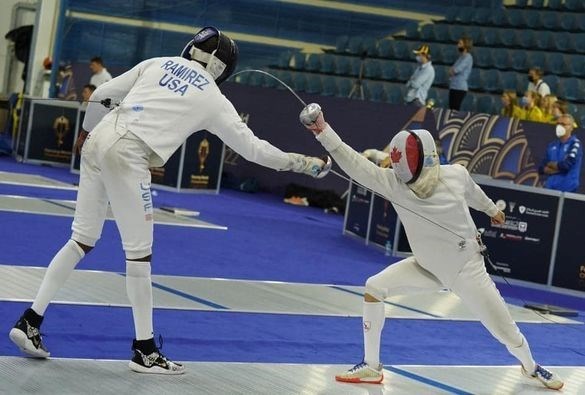YORKTON - When your grandfather is Joe Fafard and your father is Joel Fafard you might expect to follow a path focused on the arts.
Joe Fafard is after all a well-respected artist, perhaps most recognized for three sculptures of cattle (Potter, Valadon and Teevo) which are part of an outdoor installation on the corner of Albert St. and 23rd Ave. in Regina.
Joel Fafard is an award-winning guitarist who performs southern roots and blues classics with more than a half dozen recordings to his credit.
But, Fynn Fafard has found his artistic talents have manifested in a decidedly different way – in how he wields an epee sword.
The younger Fafard said his introduction into fencing actually has a family connection.
“Actually, my Dad (Joel), used to fence a little bit when he was a kid,” he said.
And, when the family moved from Lumsden where Fynn was born to B.C. when he was eight, it opened the door to him picking up a sword.
Fafard said it was a natural attraction for a youngster drawn to movies such as Pirates of the Caribbean and Princess Bride.
So, at around age eight he tried it, liked it well enough, but didn’t really pursue it until around age 13.
“One of my friends was doing competitive fencing. I remembered I enjoyed it,” he said, adding it was at “the more competitive level when I really started falling in love with it.”
In that regard Fafard was fortunate the family had moved west. While he noted there is a fencing club in Regina the sport is better developed in B.C., including at the highest level having the national program based out of Richmond.
Fafard has made something of a progression in the sport through his years of development.
“I started with foil when I was young,” he said, adding the foil is a bit more restrictive in terms of a discipline, with scoring restricted to thrusts hitting the opponent’s torso.
Then he picked up the epee which is the largest and heaviest of the three weapons used in the sport of fencing.
“It’s still a poking weapon,” explained Fafard, but the scoring target on the opponent is not restricted to the torso.
For the record the third weapon in fencing is the sabre which is actually a slashing weapon, and in general “epee is definitely the most accessible,” adding that means more combatants on a worldwide basis.
So why epee for Fafard?
“I just really like the strategy,” he said, adding the discipline feels to him to be more about planning attacks and defence because of the larger scoring field.
As it turned out Fafard not only liked epee, but proved to rather adept at it, and soon began competing across Canada, and then onto events beyond the country’s borders as a member of Team Canada.
Team Canada is made up of four male and four female fencers in each of the three disciplines.
Typically fencers compete as individuals and then in a discipline specific team event.
Fafard is part of the men’s epee team with Dylan French, Sam Gallagher Pelletier and Nicolas Zhang.
“With epee it’s very team-oriented. All the Canadian teams are that way. They’re all very supportive of how teammates are doing,” said Fafard.
Certainly, in Canada fencing is not a high profile sport and support funding is limited, but Fafard said the team is gaining some momentum.
“We’re definitely getting better. Some amazing fencers have come out of Canada for a long time,” he said, adding the issue has been gaining some consistency in terms of turning out top competitors … But I do think the country is moving up.”
As an example the Canadian women’s epee team is 18th in world rankings, with the men 24th.
Fafard and the team recently competed in the World Fencing Championships in Cairo, Egypt.
Individually, Fafard finished 78th, which he admitted was disappointing.
“I felt like I could have given more,” he said, adding ultimately he did gain experience he hopes he can use moving forward.
As a team Canada took on the United States, and defeated the obvious rival.
“It was a huge moment for our team,” said Fafard, adding that even losing to China in the round of 16 was seen as a positive.
“Overall it was a big competition for our team,” he said.
Of course Fafard’s eyes, and those of Team Canada are set on С����Ƶ at the next Summer Olympics in France in 2024.
That means as much practice as possible while juggling a job.
“I’d love to prioritize my fencing and it be my life, but that’s not possible in a niche sport. There’s not a lot of funding support,” said Fafard.
So, he holds down a job to pay the bills and gets to the gym to work out and ‘spar’ two or three hours a day after work.
At least С����Ƶ in Richmond he has other high calibre fencers to push his development.
“I’m very lucky to have a high level club in Richmond – lots of high level partners,” said Fafard. “I’d just love to put more time into it.”






